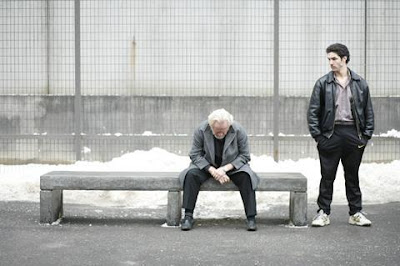19 year old Malik El Djebena (Tahar Rahim) is arrested and put in prison for beating up a cop. Under-educated and street-dumb, he's easy prey in the French prison system. And Arab-Corsican, he's an outsider in a cell-block population made up of Corsican partisans and Muslim detainees—well, that's what they say, anyway. Malik can only be a "lone wolf" for so long, and soon the Corsicans bring them under their protection—for a price.
He has to "make his bones" first; he must kill a "just-passing-through" star witness in a racketeering trial against the Corsicans. Once accomplished, done in as grisly a fashion possible ("He's going to bleed a lot, so watch your shoes" is the advice), two things happen: he becomes "the porter" for the leader of the Corsicans, César Luciani (Niels Arestrup) and given certain privileges for his status—the guard system is friendly to the Corsicans; and his victim keeps showing up in his cell in spirit form, initially haunting him. Both connections are very useful in his education.
There's been a lot of mushy verbiage rasped about this film being a French
"Godfather," and there are some surface similarities. But A Prophet owes more to Kurosawa and Shakespeare (aren't the two related?) than to Coppola and Puzo. Sure, it's about a young man's education rising in the ranks of a blood organization, but there the similarities end.Malik is not born into his "Family," coming from privilege—far from it. He's an outsider, and will stay an outsider (despite very loyal attachments) throughout the entire movie. He's a zephyr, moving between the Corsican and Muslim worlds, a part but apart, just as he becomes a citizen of both the prison and outside worlds once his good behavior buys him some time as a half-way. The connections he makes in prison are the important ones, and he soon finds himself, through a combination of luck, guile and networking the head of a cocaine smuggling ring—while still in prison.Stylistically, the film is night and day from The Godfather, despite that they both open in darkness. But where Coppola's style is formal and staged, director Jacques Audiard is up-close and hand-held, moving constantly and delving into the surreal with slow motion, and dream sequences (and the occasional pin-hole camera shot). Audiard is also adept at shooting violence, building tension, and then letting loose with gritty sequences that not only get the heart racing, but also make you worry about the protagonist—it's never easy to kill someone, despite what the movies say. There's one bizarre shot of Malik on the floor of a car in the middle of a fire-fight—a fire-fight inside the car, mind you—where he watches in slowest of motions as bullets hit the console around him, never touching him. But be that as it may, one should be mindful of the throat-slashings, the puncture wounds, kitchen utensils under the eyeballs, and the near-occasion of vehicular assault on deer. Not for the squeamish...or the vegan.
A Prophet is a nicely done modern take on the gangster story. But don't be surprised if you end up thinking it's the dark side of the Horatio Alger story. It won the "Grand Prix" at the 2009 Cannes Film Festival.






No comments:
Post a Comment